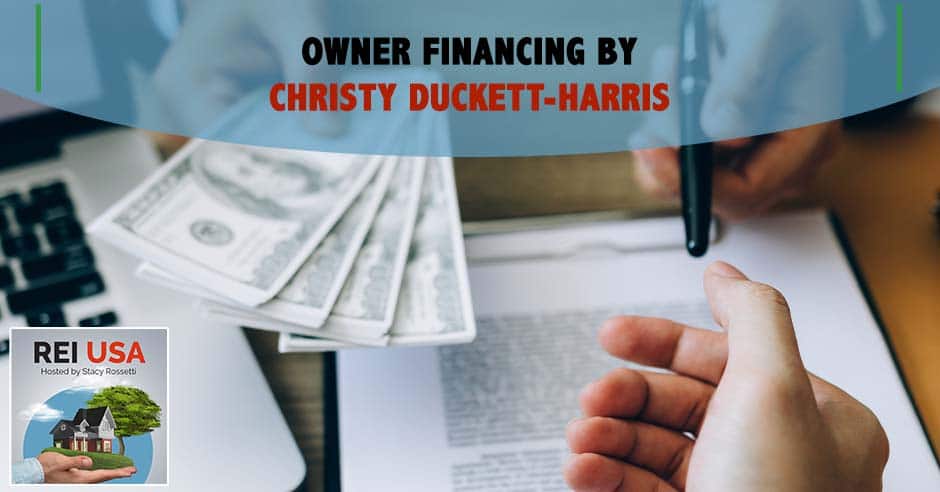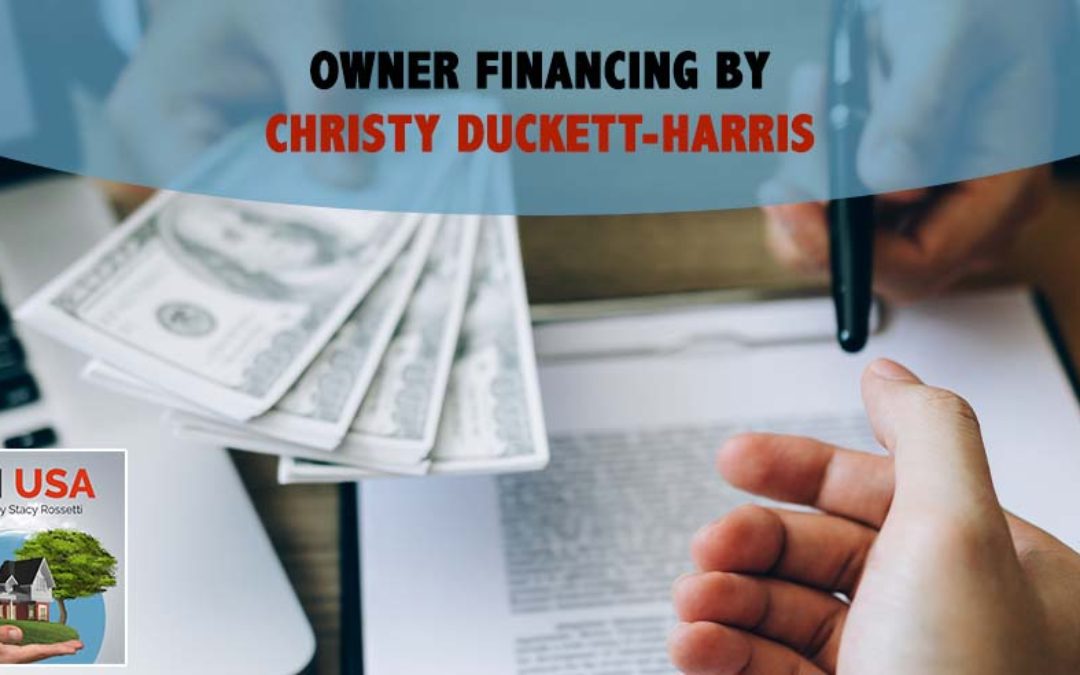
Owner financing is when a property’s seller finances the purchase for the buyer. We learn more about this strategy in this episode as Christy Duckett-Harris shares her expertise on owner financing options. She discusses factors that you should consider with this approach. She dives deep into the actual deals and negotiations to help you better comprehend different things you need to know in real estate investing. This might just be the help you are looking for. Listen in!
—
Watch the episode here
Listen to the podcast here
Owner Financing By Christy Duckett-Harris
My name is Christy Duckett-Harris. My husband and I are both teachers for REI-USA. That’s why you see Christy and Noah together. He’s going to be presenting on raising private money right after I’m done with my section on seller financing. I want to talk about how to get maximum results and spend minimum time. That’s important in this day and age because we tend to waste a lot of time that we don’t need to. I’m very guilty of that.
Outside of our real estate business that we do run full-time, we have two children that are almost the same in between ages as Stacy’s daughter. We have my youngest son and my oldest son. To share a little bit with you about minimal time spent, our youngest son is autistic. I have learned to value my time with people and maximize my dollars in real estate. I want to walk you through a little bit about what we have done briefly, so you know who I am.
I have been investing since 2007. We have done all facets of the business. We focus on single-family homes, mobile homes, short-term rentals, and long-term rentals. You name it. We have done it. I want to go through who we are with REI-USA and what we do. Pick up your phone and say, “Siri, remind me to join Noah and Christy’s training on the third Thursday of the month at the lunch hour.”
We used to do it in the evenings but that got a little hectic with kids. Sometimes we were teaching, and I heard a little knock on the door from my son, who wanted to come in and not go to bed. We decided the lunch hour was good. We also love the lunch hour because in the evening hours, sometimes people can’t make it. They have the same thing. They are winding down for work if they are doing this part-time. Also, they are trying to get the kids to bed.
We are doing the third Thursday of the month typically. On May 18th, 2022, we are going to do the third Wednesday of the month. That’s only because we are taking a little vacation. We figured we deserved a little vacation with the kids. Our anniversary is coming up. Typically, it’s the third Thursday. You will see us there at 12:00 PM Eastern Standard Time. What we would like to do is teach all different topics.
If you jump on there live and you have a request for the following month, please let us know because we are super open to that. We want to teach about what you want to learn about. We teach all topics of the business. To go a little more into owner and seller financing, this was hard for me to pick a case study because I’ve done a lot of owner and seller financing. It was hard for me to think about which one showcases the things I wanted to touch on.
There are a lot of properties we purchased with owner-seller financing. I sold a property. A buyer completed the note on this. We did it on fifteen-year owner finance. That was a good steady stream of income. I want to show you how you can work with sellers and maybe specifically tired landlords because I’m encountering a lot of them with the pandemic. This was a tired landlord situation.
I’m in the Columbia, South Carolina market but I know this is very common. I’ve coached all across the United States. I’m seeing that this is common in a lot of markets. You are getting a lot of people that want to downsize their rentals because they may be getting older. A lot of Baby Boomers own a lot of the real estate, and they are the more hands-on type of investors. They are to a point now where they don’t want to do the work anymore.
[bctt tweet=”Value time with people. Maximize dollars in the real estate industry.” via=”no”]
They don’t necessarily want to cut their income stream. They still want money coming in. Seller financing is very appealing to them because it creates this stream of income still continuing to come in but they don’t have to swing the hammer, do the work, and deal with tenants. You will hear that a lot of times, “It’s a young person’s game or a younger person’s game.” That’s where Noah and I come in and go, “What’s the opportunity here?”
I want to talk to you about how to introduce owner-seller financing to the actual seller. Maybe you are a newbie and experienced but you are saying, “Christy, things are moving so fast in this market. People are offering way over the asking price. Why in the world would a tired landlord, a seller or somebody going through a divorce want to seller finance? That doesn’t even make sense when they can sell, cash out, and be done.”
We are going to talk about why they might not want to and what we can help them do. Importantly, we are going to talk about structuring the deal with the seller. This is important because we want to make every deal that we do in the business a win-win. If it’s not a win-win, then I honestly don’t want to do the deal. We have worked with people who have gotten divorced and people who have lost a loved one or lost their job.
A lot of times, we are working in a situation where I want them to feel good about it. I’m not out there to make money. That’s not my goal. That’s why we have been in the business so long. That’s why the number one way of our marketing is referrals because I believe we do look for that relationship building and win-win. I’m going to show you how to do that with the seller and then also how to negotiate the financing terms.
That’s important because a lot of deals we are looking at don’t necessarily make sense. I keep saying this, “How and why in the world is someone buying this property to flip or to keep?” I know what they are buying it for because I track every lead that I put an offer in on. I track that if I don’t get the deal to ultimately see what that deal closed for. I’m going to give you a perfect example. I’ve got a house next door to a four-unit we purchased in January of 2021.
I had that thing rehabbed and up and running in no time. The next-door neighbor bought the house. The guys are still renovating that. It hasn’t even gone on the market. Every time I drive there, I’m telling my husband, “How is this thing not on the market. It’s vacant.” There has been a dumpster there for an entire year. I’m like, “The dumpster fee alone has $15,000 by now. This doesn’t even make sense.”
How do we negotiate the financing terms so that the deal makes sense for you and them? It has to be a win-win. I want to walk you through a case study of how we structured this deal and what that looked like on the front side and the backside for us to make money on that. How do you introduce it to the seller? You can tell I’m a pretty energetic and hyper person. I love to talk. That’s not always good in real estate. Sometimes the most important thing is listening.
We want to build a relationship and rapport and make a friend but ultimately, sometimes we need to shut our mouths and listen because a lot of times, these sellers are telling us exactly what they want. If we listen to what they are saying, we can make the deal work because we are listening to the facts and then problem-solving. There’s a quote from a very good friend of ours. We have had him on our REI-USA weekly or monthly call. His name is Jamie Miller. He talks about the art of conscious communication and how important our words are.

Owner Financing: The number one way of our marketing now is referrals because we do really look for that relationship building and win-win.
I’m a mom and a wife. I find the words you use with your children important because they repeat them. They listen to the things you say to your spouse and people because a certain tone can come off the wrong way. A certain way you phrase the question can come off wrong. It’s important when you are dealing with real estate in the same sense because sometimes you are talking yourself out of the deal instead of talking yourself into it. Communication is huge.
We want to talk about residual income when we are doing owner-seller financing and why it is that important. Think about this. It’s the same way it works for any type of private money or anything like that. Someone typically owns property because they kept it and wanted a monthly income or that mailbox money. They wanted a check to come each month. When we think about residual income, that’s usually the selling point.
The problem came into play when that person didn’t think about, “What happens when the tenant stops paying for four months. What happens if they rip up my property? What happens if the AC unit goes out?” That residual money, instead of going up, is going down. A lot of times, if you were to offer someone a return on their money or tell them, “You don’t have to do anything on this property. I’m going to pay you $400 a month versus if you rent it yourself, you might make $850 a month but you are going to have to deal with the repairs, rent collection, and all of that.”
Sometimes with the residual income, they thought they were going to make that $850 payment per month. The $400 guaranteed from someone like myself is a much better option for them. We want to push hard on the residual income. It’s making a good return. What’s a good return to someone? I don’t know. You got to listen and ask them. We hear this all the time. Never over-promise. That’s the worst thing you can do. This goes for the money we are borrowing on our rehab deals.
Immediately, especially when you are brand new, you are thinking, “I have a great deal but now I need the money.” You become a motivated investor, which is never the best place to be. What ends up happening is you come in and go, “I’m going to offer you 15% in three points right off the bat.” Who’s going to say no to that? The problem when you aim too high with any of your lenders or seller finance people that you are working with or your sellers is now you can’t go backward.
I always say, “Start low and move up.” First, ask them, “Where is most of your money invested? What are you making on your money? What’s a good return to them? What are the banks paying? If you are going to purchase a property, what are bank rates if you are buying a rental property? What are they if you are selling?” You want to look at all those statistics.
The big part I love about seller financing is removing the headache and stress. I’m okay with hustling a little and spending a little time doing stuff. We buy a passive income for the set goal of having the residual income, the same as anybody in this situation. We want that monthly income. We don’t have to show up and work a job. Eventually, I’m going to say probably when you ask me in 10, 15, 20 or 25 years, I will listen.
Maybe I would be interested in owner-seller financing my properties to someone a little bit younger because I don’t want to deal with the headache and stress. Even if you put property management with your properties, as glamorous as that sounds, there are still issues that happen. You are going to get a phone call if you are managing it yourself that there’s a leaky toilet.
[bctt tweet=”A lot of baby boomers own a lot of the real estate and they are the more hands-on type of investors.” via=”no”]
If you are not getting it, your property management company is getting it, and you are probably paying them 8% to 10% on your long-term rentals or your short-term rentals. You might be paying them 20% to 25%. There are still headaches and stress because even if you are not doing the day-in and day-out stuff, when you are getting your monthly payment from your property management company of what you made and what your return was, it’s going to be a lot less because there’s more maintenance.
Know that there are different things that can happen. We had a big storm roll through. Immediately, we are property owners. They even shut down school a little bit early. In the South, they freak out about everything, which maybe it’s a good thing. They thought there were going to be high winds early. We did have high winds but they were later. Even at our house, it hailed, and trees were down.
Automatically, you are like, “This one property I have downtown is surrounded by trees. I hope nothing fell.” Automatically, there’s some stress that comes along with that. Taxes from the sale, a lot of people like to seller-owner finance their properties because they don’t have to pay all the taxes upfront when they sell the property as a whole. If they are able to accept payments from you, there are different tax advantages and strategies to that.
I recommend you find an attorney and an accountant that helps walk you through the process of what’s the advantage. If I’m working with someone to seller finance, what’s the advantage of them keeping the property and holding the note? These are total selling points. How to introduce this to someone? Noah and I, when we are buying properties, we are going to keep them or flip them because, remember, we could keep, rehab, and sell some of these seller-owner financed properties or keep them as long-term rentals. It doesn’t matter. That comes down to what is our exit strategy.
It’s important to know when you are working with a seller. This works with everything in life. When you present someone with an offer, and it’s just one offer, that 50% to 75% of the time is going to fit someone’s needs. If I offer a two-part, let’s say, I go look at a rental property and say, “We are going to offer all cash deep-discount,” maybe that works. Maybe it doesn’t. If I don’t give them a second option, what’s the first thing they are going to do? They are going to say, “That doesn’t work.”
I’m shut down. I can’t even come back with the second option. I’m stuck. It was like, “That was my only option for them. That didn’t work. They have moved on to the next person.” Instead of doing that on everything we do, whether it’s rehab, buy-and-hold, or wholesale, it doesn’t matter, we offer two options. The first is all cash deep-discount. I will show you how that worked in my case study. Offer number two is seller financing terms with a higher offer.
That’s important because sometimes, when you offer that low price, people get offended. Even though we know what the property’s worth and we have run the numbers, you have to remember that a lot of these people think that we are offering them something low because we are making $1 million on each property. They have watched these shows on TV. They know how it works. They don’t understand that we have holding costs, taxes, repairs, and all of this.
If we didn’t do a good job explaining that when we have a low-ball offer, they are going to automatically say, “Nope.” If we offered them a higher offer with terms that show them how they can make a little more money over time, they might say, “This makes more sense. I’m willing to do that.” Remember, I believe that in anything you are doing in real estate, there’s a two-offer system.

Owner Financing: Sometimes you’re talking yourself out of the deal instead of talking yourself into it. So communication is huge.
This property was on Whiteford Road. This was a tired landlord. The tired landlord’s name was Ray. This deal is probably over 9 to 10 years old in 2022. The reason I remember that Ray was one of the nicest men I had ever met. He was probably in his early 60s. He never had children. His wife, unfortunately, passed away from cancer. He inherited this property from his aunt and uncle, who also had no children and thought of Ray as their child.
The aunt and uncle thought they were doing Ray a huge favor. They thought, “If we are going to leave this to Ray, this is going to be great for him because he’s going to get this awesome property. He’s going to be able to rent it.” They were wrong. They had no idea what they were doing to poor Ray. Ray was the nicest guy and the biggest pushover landlord. I mean that in the nicest way.
If the tenants didn’t pay rent, it was like, “I understand you are having an issue. You can pay next month. You don’t have to pay the late fee.” Guess what started happening. Do you know how that old song and dance go? They stopped paying altogether and then didn’t take care of the property. Ray saw one of our bandit signs. This is how we found this deal. We advertise on a bandit sign.
You always see, “We buy houses.” We decided to change the message up a little to test and measure. Our message read, “Tired landlord? Sell me your home. Call now.” Ray was going to the property to collect rent or fix something and saw that sign. He’s like, “I’m a tired landlord. I’m going to call them.” He did. When he called us, we were like, “We know this neighborhood. It’s very good.”
We specifically knew that neighborhood and put that sign at the front of the neighborhood sign next to the gas station because we knew we would get calls. When we started talking to Ray, we listened. We were like, “Poor Ray is getting hosed on this property.” It’s never always a blessing when you inherit property. Mind you, this property was owned free and clear but you still have to pay taxes and insurance and deal with the upkeep.
Sometimes when people inherit properties, it’s not a blessing. It’s a curse because they don’t do this business full-time. Remember that when you are talking to someone. At the time, we were able to have a great rapport with Ray because he was such a nice guy. It was like, “I want to help him. I’m going to listen and make that offer.” He liked the idea of making money but the reality was he was making no money because the tenants weren’t paying.
He was the best prospect because if we offered him anything, he probably would have been open to taking it. We started looking at the numbers on the property. It’s interesting. I had not thought about this deal until Stacy was like, “We are going to present on financing deals and how to raise capital.” I was like, “This was a great owner-finance deal. I would love to showcase this.”
I pulled this property because we don’t invest a lot in that neighborhood. It has transitioned. It was a higher rental lease-to-own neighborhood back when I bought it. Now it’s a good retail neighborhood. I couldn’t believe the properties they are selling now, all the way up to $145,000. I was like, “I should have kept this property,” which is what I say about every property itself. It’s also cool to see what the market has done.
[bctt tweet=”It’s never always a blessing when you inherit property.” via=”no”]
When we started talking to Ray about this, we realized the numbers had to make sense for us too. The ARV, which is the After-Repair Value of the property at the time, was about $80,000. We knew that was a good starting number. It needed minimal repairs in the carpets. The house needed to be painted. There wasn’t much we had to come in and do, which was great because that’s what also made it appealing to us. There was some landscaping. It was more like crummy landscaping.
They had a dog in there. That has ripped up some trim work and stuff like that but all in all, everything looked good. It’s a very stable older community. We went to Ray and said, “We have run our numbers on our end. We think that a $50,000 purchase price will work for us.” We went back and forth and he was like, “$50,000 works for me.” Remember, Ray inherited this property. He owned nothing on this property. He just wanted the headache gone.
When we started running numbers, we knew that we could probably do a five-year balloon on that property, meaning in five years, we could pay off that whole mortgage because I already had an end strategy in mind. It wasn’t to keep this as a rental for ourselves. It was to resell it on a lease with the option to purchase from someone else. That’s exactly what we did. We started at $5,000 for the down payment but because he liked us, he was like, “$2,500 is good.”
At this time, it was me and my other business partner. He said, “I trust you, girls. I know you are going to do a great job. You do this business full-time.” We ran the amortization chart over 30 years and decided to pay him 6%. Some of you are probably saying, “Why would you pay him 6%? Why didn’t you offer 4% or 5%?” The numbers still made sense. I wanted Ray to feel good about it, and I wanted it to work. We ended up making him a monthly payment of $284.79.
We knew that we were able to rent this property back to someone for $850 a month. The cashflow for us was very good. It all made sense. This is an important step. A lot of people do owner financing or seller financing and don’t have an attorney draft the paperwork or file anything. I know this because I’ve encountered a lot of people that have done it. I’m going to tell you why that’s so important.
Before Ray ever received his first payment, he passed away. We didn’t know Ray had passed away. We closed on the property and moved the tenant in. Ray was like, “Mail me the checks monthly.” 2 or 3 months had gone by. We were mailing checks to Ray and he was not cashing them, which I thought was odd. We tried to call him. We were like, “This is weird. Why is he not cashing these checks?” We couldn’t get ahold of him. Remember, his wife had passed away. He had no family.
We ended up calling the attorney. The attorney said, “Ray passed away three months ago.” We did this deal. What’s interesting about this deal and how this transpired and switched, I will tell you at the very end with him passing away. He had left 3 properties, not just 1. There are two additional properties to his best friend, who now inherited two other properties with the headache. Ray thought he was doing his best friend a favor. His best friend was like, “I don’t even want these properties.”
What ended up happening was we had everything drafted, thank goodness. The balloon note was still doing five years. Everything went on as planned. His friend, Ken, inherited the property. Ken cannot accept any payments from the estate for five years until we paid off that property. It left us in this unique and good situation, even better than we bought it because we knew Ken might want to cash out before. Maybe we can negotiate with him.

Owner Financing: Sometimes when people inherit properties, it’s not really a blessing. It’s a curse because they don’t do this business full time. Remember that when you’re talking to someone.
Our exit strategy was we control the property with $2,500 down and a $387.65 payment. We decided to do a two-year option to buy or lease with the option to purchase from someone else. We moved a young couple in. It was a boyfriend and girlfriend. They ended up paying $850 a month. We ended up holding the note for five years. They paid $850 a month for five years because we extended.
Remember, when somebody does that, they need to get their credit cleaned up. They didn’t clean their credit up as they should. It was no big deal. There’s the purchase price with the new tenant. We controlled it at $475. Their purchase price was $80,000, what the market value was. We were able to collect that $850 for all those years and still continue to pay that $287.65 to Ray’s estate. That couple ended up getting financing at some point to take over that property, which they still own to this day.
That’s why I pulled it to see what the value was and see if they still own it. It was a young couple. It helped them create home ownership, which was cool. It’s a win-win but the roller coaster and the ups and downs of what happened are over those years that we paid the difference with the tenants, the money that we made paying out the note that we had to Ray or two his estate now that he passed to his best friend, Ken, was $20,347.56.
That was the difference of the $850 minus what we paid him monthly. Remember, we did an option to purchase with them. Originally, we had $475 but what ended up happening was they bought the property. We were going to $80,000. We got an awful appraiser. We had all the comps. I pulled the appraisal to see how did that work. I didn’t find it. I should have but I didn’t care. I made my money on the house.
The appraiser saw they were a young couple and was like, “We are going to under-appraise this to help them out.” They appraised it. They ended up buying it for $65,000. We still made that difference in money because they had paid that $850 minus the monthly payment. That had left our loan balance at $37,247.56. When they bought it at $65,000, we made all that money in between, including that $20,000 and the first line there, because that’s what they had paid us, which was amazing.
We went back to Ken, who inherited the property and were like, “We can pay him $37,000 but who cares? Let’s throw it out there.” In actuality, I’ve said this wrong. We had a five-year note. In three years, we got them financed to purchase. There was still time to go in and hold that note for an additional two years. We could have made all that money and kept going but they got financed.
We decided to go back to Ken and say, “Will you take $28,000 now for us to be out? You will get your money sooner.” Remember, he couldn’t accept any of those payments until we sold the house and the estate was closed out. We ended up negotiating him down to $28,000. We got to keep the difference there too. It ended up being a front payday and a back payday all around. It was a killer deal.
When I pulled this up to do it, I was like, “This was an amazing deal. I’ve forgotten how good it was.” It’s cool to see. With the right technique of listening and talking to people, you can make a lot of money but also make it a win-win, which is important. That was my case study. Here’s my reminder. Noah and I do the training each month with Stacy’s REI-USA on the third Thursday of the month. In May 2022, it will be on the third Wednesday at 12:00 PM Eastern Standard Time. Thank you for reading.

Owner Financing: Find an attorney and an accountant that actually helps walk you through the process of what’s the advantage of if I’m working with someone to seller finance.
That’s the way you are supposed to do your deals.
If I could only find one a day or a month like that.
If only we can find a property for $50,000.
When I looked at that, I said, “It’s worth $140,000.” I’ve done this with all my properties. I backtrack what they are worth. I’m going to, “I need to keep these properties forever.” That’s real estate.
I appreciate you coming on and putting your slides in of when you teach, so everybody knows when it is. That’s important. Thank you very much for that.
Important Links
About Christy Duckett-Harris
 Christy Duckett-Harris is a real estate investor from South Carolina. Christy is heavily sought after for her knowledge on rehabbing, passive income properties, and mobile homes. She’s an award-winning coach with a love for helping others. Being a business owner, married, and a mother of two, she’s done anything but slow down. This supermom has mastered what it takes to balance the chaos of family life and real estate investing.
Christy Duckett-Harris is a real estate investor from South Carolina. Christy is heavily sought after for her knowledge on rehabbing, passive income properties, and mobile homes. She’s an award-winning coach with a love for helping others. Being a business owner, married, and a mother of two, she’s done anything but slow down. This supermom has mastered what it takes to balance the chaos of family life and real estate investing.

